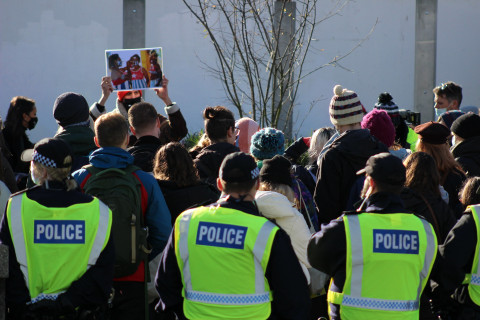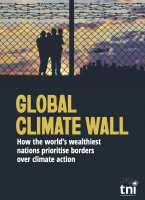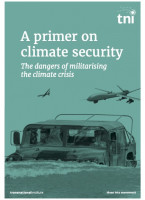COP26 – What Next?
COP26 failed to muster enough political will for climate action, but there was no expense spared in one arena.

Ric Lander/Flickr/creativecommons.org/licenses/by-nc-sa/2.0/
In the largest armed deployment in Scottish history, 10,000 police officers were drafted in to swamp Glasgow’s streets. Police chiefs said their presence was for the ‘safety of the public’, but it was noticeable that they were almost exclusively deployed against peaceful protestors and that not one oil company CEO (undoubtedly the biggest threat ever to humanity) was arrested. In fact, fossil fuel executives made up the largest delegation of delegates within the ‘blue zone’, the most fortified zone guarded by phalanxes of police.
The Glasgow climate summit represents a microcosm of today’s politics of security, in which states resort to militarised and security responses rather than tackling the underlying causes of social and environmental crises. Notably, this single event police operation named Urram (Gaelic for respect) cost £200 million, six times what the North African nation Mali spends each year on addressing climate change. TNI’s research in a report prior to the summit, Global Climate Wall, tells a similar story. It revealed that the richest countries are spending more than twice as much on border and immigration enforcement than on climate finance. Militarisation has become the rich world’s climate adaptation policy.
The reason for this is that recent decades have seen the combination of two dominant paradigms that impede climate justice. The first is the ideology of neoliberalism that unshackled corporate power and impeded any effective state action to radically reduce climate emissions. The second is the rise of security policies and infrastructure, particularly in the wake of 9/11, that has made ‘security’ the overriding raison d’etre of the state. There is not a problem in the world that doesn’t have a security ‘solution’, even climate change, where the term ‘climate security’ is increasingly bandied about by military generals and politicians. Indeed NATO’s Secretary General, Jens Stoltenberg attended the Glasgow summit for the first time, arguing that ‘security and climate [are] two sides of the same coin’.
The central question this raises is whose security? The policing at Glasgow points to the answer, because it is clear that the ‘climate security’ advocated for is for the security of those inside the global ‘blue zone’, not those most impacted by climate change. NATO’s latest climate security plan, for example, seeks mainly to ensure security of military assets and the protection of its wealthy members and their economic interests during a time of climate breakdown. It is certainly not aimed at guaranteeing the security of those forced from their homes in the poorest countries as a result of extreme weather. In fact, it warns of the ‘threats’ posed by migration as a result of climate change, turning the victims of climate-caused displacement into today’s latest security challenge. We can see the deadly results of this approach today with the rising death tolls of refugees in the Channel between Dover and Calais.
The challenge for peace and climate movements going forward from COP 26 is therefore not just to stop worsening climate change, but also increasingly to challenge states on how we respond to them. We must oppose a security response to climate change, and defund and dismantle the military and security systems that will invariably worsen the impact of the climate crisis for the most vulnerable communities and peoples. A just transition depends on an end to the war and security complex.


